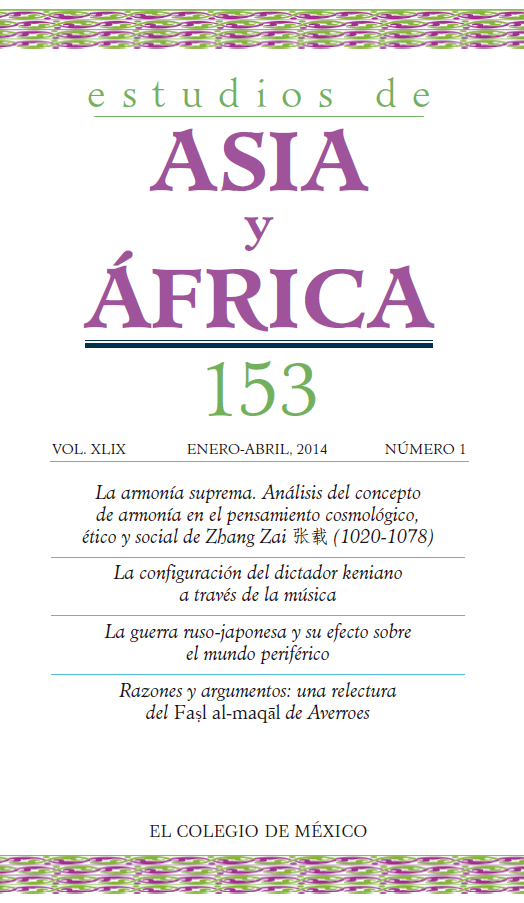Abstract
He 和, usually translated in English as “harmony”, has always been one of the key concepts in the history of Chinese thought from Confucius to Mao Zedong and the contemporary Chairman Hu. The first characteristic of the Chinese way of thinking is that it is synthetic in its emphasis on the whole rather than its parts, on complementarity rather than opposition, harmony rather than conflict. It is a system where universe, society and man represent both macrocosmic unity and microcosmic particularity. This essay focuses on the analysis of this concept in Zhang Zai’s philosophical system. I show how the neo-Confucian philosopher develops this idea from his cosmological thought where harmony is the ideal cosmic state, the source and the beginning of all phenomena. From the cosmos to the society the Zhang Zai’s “Supreme Harmony” become the main goal for human ethics, a perfect state which it can be reached through a correct and appropriate social relationship.References
Chan, Wing-Tsit, A Source Book in Chinese Philosophy, Princeton, Princeton University Press, 1969.
Chen, Shantian, Chinese Dialectics: From Yijing to Marxism, Lanham, Lexington Books, 2005.
Cheng, Anne, Storia del pensiero cinese, Torino, Enaudi, 2000. Chow, Kai-Wing, “Ritual, Cosmology, and Ontology: Chang Tsai’s Moral Philosophy and Neo-Confucian Ethics”, Philosophy East and West, vol. 43, núm. 2, 1993, pp. 201-228.
Confucio, Dialoghi, trad. al cuidado de Tiziana Lippiello, Torino, Piccola Biblioteca Einaudi, 2006.
Elorduy, Carmelo, Chuang-Tzu, Caracas, Monte Ávila Editores, 1972.
Feuillas, Stephane, “L’accès à l’âme du monde. Définitions et aproches à partir de l’oeuvre de Zhang Zai (1020-1078)”, Extrême-Orient, Extrême-Occident, núm. 29, 2007, pp. 121-150.
Gernet, Jacques, La Raison des choses: Essai sur la philosophie de Wang Fuzhi (1619-1692) , París, Gallimard, 2005.
Huang, Siuchi, “The Moral Point of View of Chang Tsai”, Philosophy East and West, vol. 21, núm. 2, 1971, pp. 141-156.
Huang, Siuchi, “Chang Tsai’s Concept of Ch’i”, Philosophy East and West, vol. 18, núm. 4, 1968, pp. 247-260.
Kasoff, Ira, The Thought of Chang Tsai (1020-1077) , Cambridge-Nueva York, Cambridge University Press, 1984.
Kim, Jung-Yeup, “Zhang Zai’s Philosophy of Qi: A Pratical Understanding”, tesis de doctorado, Hawaii University, 2008.
Kuttner, Fritz A., The Archeology of Music in Ancient China: 2000 Years of Acoustical Experimentation 1400 b.c.-a.d. 750, Nueva York, Paragon House, 1989.
Lai, T. C. y Robert Mok, Jade Flute: The Story of Chinese Music, Nueva York, Schocken Books, 1985.
Li, Chengyang, “The Confucian Ideal of Harmony”, Philosophy East and West, vol. 56, núm. 4, 2006, pp. 583-603.
Liu, Xuezhi 刘学智, Zhang Zai “he” lun tanwei 张载 “和” 论探微, Xi’an, Shaanxi shifan daxue zhexuexi 陕西师范大学哲学系, 2008.
Mao, Zedong, “Sulla dittatura democratica popolare”, en Opere scelte, Beijing, Casa Editrice in Lingue Estere, vol. IV, 1975.
Picard, François y Enzo Restagno, La musica cinese: le tradizioni e il linguaggio contemporaneo, Torino, e.d.t., 1998.
Sachs, Curt, La musica nel mondo antico, Milán, Rusconi Libri, 1992.
Scarpari, Maurizio, Il confucianesimo. I fondamenti e I testi, Torino, Einaudi, 2010.
Tomassini, Fausto, Tao, i grandi testi antichi, Torino, Utet, 1997.
Wang, Bi 王弼, Gengbo Han 韩庚伯 y Yingda Kong 孔颖达, Zhouyi zhengyi 周易正义, Beijing, Zhongguo zhigong chubanshe 中国致公出版社, 2009.
Wang, Guoxuan 王国轩, Daxue Zhongyong yizhu 大学中庸译注, Beijing, Zhonghuashuju 中华书局, 2007.
Xiang, Shilin 向世陵, Zhang Zai, Wang Fuzhi de “baohe taihe” shuoyi 张载、王夫之的 “保合太和” 说议, Beijing, Zhongguo zhexueshi 中国哲学史, 2008.
Yang, Yali 杨亚利, “‘Taihe suowei Dao’ yu ‘chou bi he er jie’” “‘太和所谓道’ 与 ‘仇必和而解’”, Zhonggong Zhejiang shengwei dangxiao xuebao, vol. 5 中共浙江省委党校学报第5期, 2007.
Zhang, Zai 张载, Zhang Zai ji 张载集, Beijing, Zhonghua shuju 中华书局 北京, 1978.
This work is licensed under a Creative Commons Attribution-NonCommercial-NoDerivatives 4.0 International License
Copyright 2022 Estudios de Asia y África



